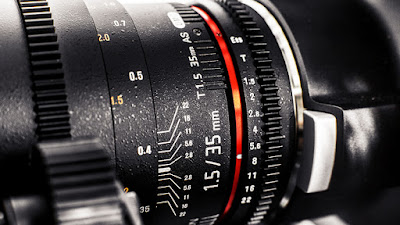The Struggle of Lens Hunting
 When you use a camera a lot, eventually you're going to want to get some new lenses to make your shots and pictures look even more top notch. That's all well and good, but then you run into the problem of digging way too deep when trying to find the lens that's right for you.
When you use a camera a lot, eventually you're going to want to get some new lenses to make your shots and pictures look even more top notch. That's all well and good, but then you run into the problem of digging way too deep when trying to find the lens that's right for you.
It's not a bad thing as in it's too complicated (although it gets crazy complex), it's not really even a bad thing, but there is a lot to know and look for when you're buying a lens. For example, on a lens for photography you would be looking at f/stops, whereas on cinema lenses you'd be looking at T-stops. An f/stop is a number that represents the relation between the size of a lens aperture to the focal length. Basically, it tells you how much light is coming through. The lower the number is, the more light is being let in. One full stop (f/1.4 to f/2.8), so basically doubling the number, means that you're letting in half as much light. A T-stop measures exactly how much light is coming through the lens at a certain f/stop (I know this is confusing and ridiculous). In other words, a T-stop is your f/stop divided by your light transmittance percentage. Here's a link to an article to hopefully help explain it better.
That was an example that highlighted how complicated lenses can get. Other examples would be the build quality, the quality of the glass being used in the actual lens, the clarity of the video and pictures taken with the lens, etc. It's harder to find reliable information on these than you might think. You also have to be aware of who is reviewing the lens, because not everyone will necessarily have the knowledge of the lens that you need. I've seen people who bought cinema lenses and used them solely for photography, which isn't wrong, but it isn't what the lens was designed and optimized for. So, if you're ever buying a lens, make sure you look up professional reviews of it, so you can get an accurate idea of how good it is for your use case.
My last bit on this topic is know what each type of lens does, or research it, because once you know the lenses that are best for your use case, it narrows down your search a lot and can help you figure out how much you're going to have to spend (hint: it's between a lot and A LOT).
Is there anything else you guys want to know about lenses? And are any of you thinking about getting into photography/videography? I'd be happy to answer any questions you guys might have, or help point you in the right direction for good equipment for your use case.
That was an example that highlighted how complicated lenses can get. Other examples would be the build quality, the quality of the glass being used in the actual lens, the clarity of the video and pictures taken with the lens, etc. It's harder to find reliable information on these than you might think. You also have to be aware of who is reviewing the lens, because not everyone will necessarily have the knowledge of the lens that you need. I've seen people who bought cinema lenses and used them solely for photography, which isn't wrong, but it isn't what the lens was designed and optimized for. So, if you're ever buying a lens, make sure you look up professional reviews of it, so you can get an accurate idea of how good it is for your use case.
My last bit on this topic is know what each type of lens does, or research it, because once you know the lenses that are best for your use case, it narrows down your search a lot and can help you figure out how much you're going to have to spend (hint: it's between a lot and A LOT).
Is there anything else you guys want to know about lenses? And are any of you thinking about getting into photography/videography? I'd be happy to answer any questions you guys might have, or help point you in the right direction for good equipment for your use case.

I've always wanted to get into photography but I know i'd fall down the rabbit hole and end up homeless with 50 cameras and thousands of dollars worth of lenses.
ReplyDelete